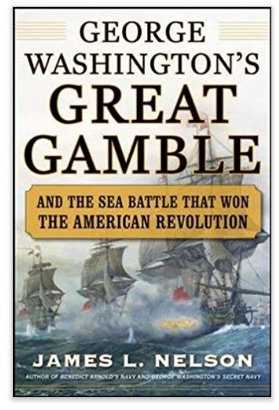In this Virginia History Blog of titles about the Revolutionary War, we look at “Wellspring of Liberty” relating Dissenter contributions to religious liberty as a republican ideal, and their contributions to Virginia militia manpower. Two titles relate to the military history of the closing campaign of the Revolution at Yorktown, “Washington’s Great Gamble and the Sea Battle that won the American Revolution”, and “Sir Samuel Hood and the Battle of the Chesapeake”.
Current releases related to Virginia history in other eras from Spring 2018 journals can be found in previous Virginia History Blogs at Colonial Virginia – Spring 2018, Revolutionary Virginia – Spring 2018, and Civil War Virginia – Spring 2018, and New South and Modern Virginia – Spring 2018.
Summer journal titles begin with the Colonial Virginia Era i , Colonial Virginia Era ii, Revolution and New Nation, and Jefferson and Madison.
The TVH webpage for Revolution, Constitution and New Nation Eras 1750-1824, features our top title picks taken from the bibliographies of three surveys of Virginia History’s 400 years: two that are widely used in Virginia college courses, and one to be published by the University of Virginia Press in 2019.
The Table of Contents divides Political and Economic Virginia, 1750-1824 into Revolution and Constitution Policy, and New Nation Policy. Topical history is treated under headings of Social History, Gender in Virginia, Religious Virginia and African American Virginian. Finally, two wars are featured under American Revolution and the War of 1812.
Wellspring of Liberty

John A. Ragosta wrote Wellspring of Liberty: How Virginia’s Religious Dissenters Helped Win the American Revolution and Secured Religious Liberty in 2010. Available from the Oxford University Press, Kindle and online new and used. A TVH top 300 source for Virginia history. A companion volume to Rhys Isaac The Transformation of Virginia, 1740-1790 (1982), a TVH top 300 source for Virginia history.
America’s inalienable right to religious liberty actually came from somewhere at a particular time. Established colonial religion was the norm from Puritan Massachusetts to Quaker Pennsylvania to the Anglican southern colonies, including Virginia, famed for jealous protection of its established Anglican Church. Unlike their upcountry kindred in the Carolinas seeking religious protection from the Crown, the backcountry evangelicals of Virginia threw their militia support with the Tidewater patriots in exchange for political participation and the end of tithes to the establishment Anglican Church.
Thousands of dissenter petitioners from Baptists, Methodists, and Presbyterians flooded the General Assembly demanding not just licensed toleration, but religious liberty of personal conscience. They found Piedmont legislative allies in James Madison’s Memorial and Remonstrance and Thomas Jefferson’s proposed Statute for Religious Freedom. After the war with expanded representation in the General Assembly, they secured disestablishment of the Anglican Church glebes. Virginia had been transformed from a place of serious religious persecution in 1776 to being unsurpassed in protecting religious freedom by 1786.
To buy “Wellspring of Liberty” on Amazon, click here.
George Washington’s Great Gamble

James L. Nelson wrote George Washington’s Great Gamble and the Sea Battle that Won the American Revolution in 2010. Available from the McGraw Hill Press, on Kindle and online new and used.
In this book, Nelson emphasizes the role of naval power in the decisive Battle of Yorktown. In August 1781, Washington in consultation with French General Rochambeau, and Admiral de Grasse determined that there could be no decisive victory over the British army in continental North America without assistance from the French Navy.
It was apparent that even a combined army-navy assault on a fortified city such as New York would not be successful. But British General Cornwallis and his southern army was bottled up at Yorktown in Virginia’s Lower Peninsula. The coordinated effort to transport the American Continental Army and its French allies from New York and Rhode Island, defeat the British fleet from relieving Cornwallis, and rendezvous at Yorktown for a combined assault was a gamble with a fortunate result.
To buy “George Washington’s Great Gamble” on Amazon, click here.
Sir Samuel Hood and the Battle of the Chesapeake

Colin Pengelly wrote Sir Samuel Hood and the Battle of the Chesapeake in 2009. Available from the University Press of Florida, and online new and used. See also Harold A. Larabee Decision on the Chesapeake (1964).
In 1781 at the Battle of the Chesapeake (Battle of the Capes) outside Cape Henry and Cape Charles, the French defeated the British Fleet sent to relieve General Cornwallis who had been defeated in the Carolinas and withdrew to Yorktown on Virginia’s Lower Peninsula. Sir Thomas Graves and Francis Samuel Drake commanded the defeated British fleet, and afterwards his subordinate Sir Samuel Hood was critical of Sir Thomas’ tactical leadership at sea.
Described later as “the greatest Sea-officer I ever knew” by Admiral Horatio Nelson, Hood had been commander of British naval forces at the time of the Boston Massacre in 1770. After the American Revolution he continued a successful naval career in the West Indies. He combined it with effective self-promotion to overshadow Sir Thomas, and subsequently became commander of the British Mediterranean Fleet.
To buy “Sir Samuel Hood and the Battle of the Chesapeake” on Amazon, click here.
Additional history related to Virginia during this time period can be found at the Table of Contents of TheVirginiaHistorian website on the page for Revolution, Constitution and New Nation Eras, 1750-1824. Titles are organized by topics related to Political and Economic Virginia, Social, Gender, Religious, African American Virginia, and Wars in Virginia during this time span.
General surveys of Virginia History can be found at Virginia History Surveys. Other Virginia history divided by topics and time periods can be found at the webpage Books and Reviews.
Note: Insights for these reviews include those available from articles in the Virginia Magazine of History and Biography, the William and Mary Quarterly, the Journal of the Civil War Era, the Journal of Southern History and the Journal of American History.

